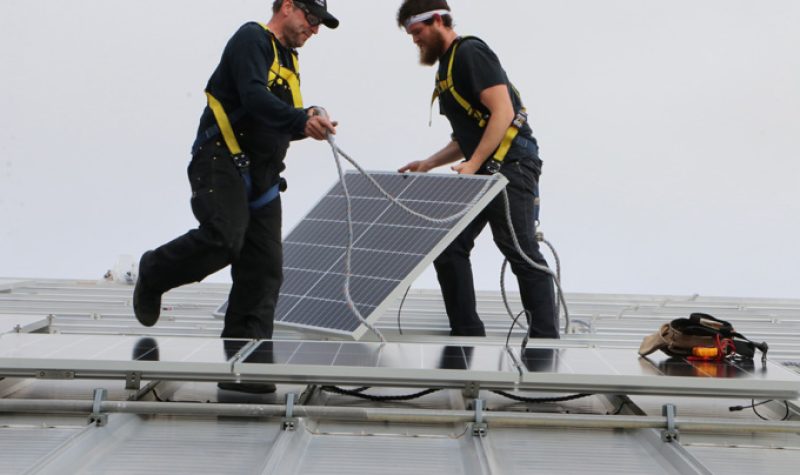At their meeting next week, Sackville town council will consider giving the okay on spending their $25,000 climate initiatives fund to install solar panels on the activity centre at the Bill Johnstone Memorial Park.
Town staff are recommending a contract with Moncton-based Vertex Solar Solutions to install 32 panels on the roof of the building. Special projects manager Kieran Miller told council on Tuesday that the array would supply 72% of the building’s annual electricity.
“Based on the electricity consumption of the building,” said Miller, “the savings in the first year are estimated to be $1,786. And that will continue to increase as utility rates rise.”
Over the lifetime of the panels, Miller said they would have prevented “315 tonnes of carbon dioxide from entering the atmosphere, which would be the equivalent of burning 121,625 litres of gasoline.”
Councillor Bill Evans was enthusiastic about the project, especially after he did the math on the annual cost savings in electricity fees. “This is going to pay for itself within about half the expected lifetime,” said Evans. “After that, with time, it’s going to be saving us money.”
Sackville resident and Climate Change Advisory Committee member Doug Bliss delivered his committee’s recommendation in favour of the project, citing it not only as a mitigation measure, but for its educational and demonstrative value.
“Being in the centre of town, at a very busy park, having this there would be a highly visible demonstration project and it could go a long way for the town of Sackville and the new municipality to be used as an education project… Lots of people are going to see this when they visit the post office and the Save-Easy and other things.”
Bliss told council that the committee worked to find a project that would fit the $25,000 budget for 2022, and small scale solar seemed like the right fit. “Typically, infrastructure demonstration projects are pretty pricey. We think that this is sort of the best bang for the buck.”
Councillor Matt Estabrooks had some questions about the proposal, including whether or not the $25,000 budgeted for climate initiatives could be rolled over to another year, instead of rushing to complete a project by the end of 2022.
Treasurer Michael Beal explained that the funds could be saved, but they would return to the town’s general reserve, without a guarantee of being added to a future climate change budget line.
Estabrooks also asked about possible funding opportunities for the solar array outside of the town, but Miller confirmed there weren’t funding opportunities for municipally owned buildings.
That stands in contrast to Sackville’s neighbours across the border in Amherst, where a Solar Electricity for Community Buildings Program sponsored by Nova Scotia’s energy department helped the town install a 75-kilowatt solar array on its stadium in 2020. The project covers about 1/3 of the stadium roof and is estimated to generate an annual output of about 123,000 kWh, which is sold directly to Nova Scotia power under a 20-year contract. Amherst is also in line for two more solar installations on its police and fire stations through the provincial program.
Miller also told council that several years ago staff looked at different municipal buildings to determine which were the best fit for solar panels. A report at the time deemed the Civic Centre a “not really feasible” and identified the Bill Johnston Activity Centre as a good demonstration site. “It was cheaper to get panels on that one, just where it’s a smaller building and the existing electrical and mechanical room,” said Miller.
Council will consider a motion on the project at their meeting next week, and if approved, the panels could be installed in as little as four to six weeks.
Before leaving the topic, Miller took the opportunity to give a shout out to Sackville climate change coordinator until recently, Kirsty Mrazek.

“This was one of the last projects that Kirsty Mrazek worked on,” said Miller, “and I just wanted to kind of emphasize how important that climate change coordinator role is, what a great job she did. This is the type of project that that role really pushes forward. So I just wanted to acknowledge the work that she had put in on this project as her last hoorah.”
Miller says Mrazek moved on to a new job more in line with her research direction, and the town hopes to fill the position of climate change coordinator again soon, with applications having closed recently and interviewing starting soon.


